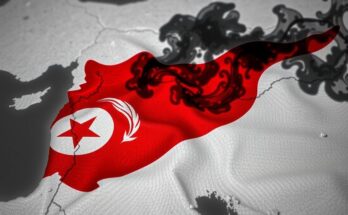The inaugural Secretariat of the Kimberley Process was inaugurated in Gaborone, Botswana, under the leadership of Ahmed Bin Sulayem, aiming to enhance oversight of the diamond trade. This office will play a pivotal role in institutional support for KP’s member nations, reinforcing the organization’s commitment to preventing conflict diamonds from entering the market. The ceremony was attended by key officials from various countries, emphasizing international collaboration in the diamond industry.
In a significant development for the global diamond industry, the United Nations-mandated Kimberley Process (KP), under the leadership of its Chair, Ahmed Bin Sulayem, inaugurated its inaugural Secretariat in Gaborone, Botswana. This historic office will initially employ five personnel and aims to serve as a central hub for the institutional memory and ongoing support of KP’s member nations and working groups. The Secretariat will be directed by Mr. Bojun Tang. The inauguration ceremony, marked by the presence of Ahmed Bin Sulayem and Botswana’s Honourable Minister of Minerals and Energy, Mr. Lefoko Moagi, underscored Botswana’s steadfast commitment to the KP during a visit to its President, HE Dr. Mokgweeti E.K Masisi. The event brought together dignitaries and officials from Botswana, along with representatives from multiple countries including Angola, China, the EU, Russia, Ukraine, the UAE, and the UK. Ahmed Bin Sulayem remarked on the occasion, emphasizing the historical significance of the KP Secretariat in shaping the future of the diamond trade. He articulated, “The opening of the KP Secretariat marks a historic day for the future of the diamond trade and the Kimberley Process—a true milestone in our commitment to ensure this is a year of delivery for the diamond industry.” The KP Secretariat is poised to facilitate collaboration among its 59 participating diamond control offices worldwide, ensuring that rough diamonds are traded transparently and responsibly. Botswana officials heralded the establishment of the Secretariat as a crucial advancement in the KP Certification Scheme and stressed the importance of unified efforts to position the Secretariat as a model institution amid global geopolitical challenges. The UAE’s directive as KP Chair is defined by a proactive agenda aimed at navigating political obstructions and implementing tangible measures, including the establishment of the permanent Secretariat in Botswana. The KP, which was established in 2003 by the United Nations, consists of 85 nations and works diligently to prevent unregulated diamonds from financing conflict. The UAE, in managing its Kimberley Process Certification Scheme through the Ministry of Economy and the Dubai Multi Commodities Centre (DMCC), has seen a remarkable growth in diamond trade, achieving a total of USD 38.3 billion in combined trade of rough and polished diamonds last year, further establishing the nation as a pivotal player within the diamond industry.
The Kimberley Process was established in 2003 to prevent the trade of conflict diamonds, and it functions as an international regulatory framework involving 85 countries and 59 control nodes. The newly inaugurated Secretariat in Botswana represents a commitment to enhancing operational capacity and collaboration within this framework. The UAE’s appointment as chair in 2016 marked a historic moment as it became the first Arab country to lead the Kimberley Process. This Secretariat aims to ensure a more effective monitoring of diamond trades and compliance with the KP’s objectives, thereby fostering greater economic benefits for African nations reliant on diamond resources.
The inauguration of the Kimberley Process Secretariat in Botswana marks a pivotal moment for the global diamond trade framework, ensuring more effective regulation and collaboration among member nations. The establishment of this office is significant in facilitating transparency and accountability in diamond trading while reinforcing the commitment of both Botswana and the UAE to the KP’s objectives. The Secretariat serves as a vital resource for continuing the fight against conflict diamonds and promoting sustainable economic growth in African communities.
Original Source: www.zawya.com




